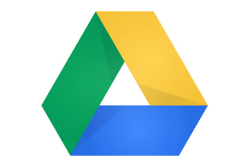Blog posts tagged backup
What does Google Drive mean for business?
 The launch of the long-rumoured Google Drive happened yesterday. But is this online storage a useful new service for businesses, or is it a step too far for a company that already knows so much about you?
The launch of the long-rumoured Google Drive happened yesterday. But is this online storage a useful new service for businesses, or is it a step too far for a company that already knows so much about you?
What is Google Drive?
If you’ve ever used Dropbox, SkyDrive, Box, SugarSync or any other cloud-based storage, you’ll be familiar with what Google Drive does. It gives you access to online storage, to which you can upload documents, photos, files … any of your data, basically.
You create a special folder on your computer (your ‘Google Drive’). Anything placed in this folder gets uploaded to your online storage. Here’s why you might do this:
- Easier backup. Google Drive creates a second copy of your data online. So it’s an easy way to backup your data.
- File synchronisation. If you use more than one computer, you can put your Google Drive on all of them – so files are managed across your computers.
- Anywhere access. You can log in to Google Drive through your web browser, meaning you can get at your files from any internet-connected computer.
- Easier sharing. You can share files with other people just by emailing them – and you can control who can view, edit and comment on them.
But what’s new? All these features are already offered by most of the other online storage services I mentioned above. Is there anything to make Google Drive different?
The Google Drive difference?
Perhaps the biggest thing that sets Google Drive apart from its competitors is the fact that it’s one of a whole portfolio of services from the ubiquitous search engine. This means Google Drive is closely integrated with elements of the company's other services. For instance:
- It works with Google Documents. This means you can edit documents stored in your Google Drive using Google Docs, the company’s online office suite.
- Searching it should be really, really good. Google does search better than anyone. So finding anything in your Google Drive should be a piece of the proverbial.
- It claims to recognise your photos. Apparently, Google Drive will recognise photos of things like the Eiffel Tower, so you can find them more easily.
There’s one other thing that makes Google Drive attractive, and that’s the price. It’s significantly cheaper than most competitors. For instance, it costs $9.99 a month (all the prices are in US dollars, even though I’m in the UK) for 50GB of storage with Dropbox. With Google Drive, twice that costs $4.99.
As with most cloud storage services, there’s also a basic free option – Google Drive gives you 5GB free, which is actually enough for loads of documents.
The true cost of Google Drive?
Google Drive is poised to shake up the online storage market. Expect prices of competing services to drop over the next few months, as Google takes a big bite of the market.
It may also be worth considering if your business already uses other Google Services, because Google Drive will work very well with them. If you’re using Google Apps for your email and document editing, then Google Drive may be a logical next step.
However, before you jump in with both feet, it’s worth just stopping to think through the implications of the service. Google uses detailed information about its users in order to show them targeted advertising. For instance, the adverts you see in Google Mail are determined – to some extent – by the content of your emails.
Google is likely to extend this capability with Google Drive. It might not show you adverts within your Google Drive, but it will almost certainly analyse your data to help it target ads at you when you’re signed in to other Google services.
So, are you comfortable granting Google access to your files, some of which may contain important business or personal information? The answer to that will probably depend on your attitude towards the company overall, and your feelings about targeted advertising.
As part of its Google Drive FAQ, CNET has a good summary of how Google says it may use your files. You might also be interested in this succinct argument against the service from Chris Armstrong and Aral Balkan’s interesting analogy.
Read Google’s official announcement about Google Drive. Will you be signing up to try the service?
Shopping list: what you need to back up your data
 Backing up your data doesn’t have to be that difficult. It doesn’t even have to involve expensive-sounding ‘backup solutions’ or wrestling with 300 individual CDs, each of which contains a small but crucial portion of your company’s data.
Backing up your data doesn’t have to be that difficult. It doesn’t even have to involve expensive-sounding ‘backup solutions’ or wrestling with 300 individual CDs, each of which contains a small but crucial portion of your company’s data.
Here are some straightforward ways to get started. Obviously, they’re not your only options – so it’s a good idea to chat to your IT supplier to make sure you’re backing up everything you need to.
After all, there’s nothing worse than smugly telling everyone you’re all backed up, then realising you’ve lost your ground-breaking 400-slide PowerPoint presentation.
The cheap and cheerful option for home-based businesses
Sure, it might be cheap and cheerful, but this approach will get the job done for you.
Buy yourself two external hard drives. These can be attached to your PC, allowing you to copy data to and from them. Do this regularly. Daily if you can.
Copy all your important data, including accounting data, word processing and spreadsheet files, plus your email, calendar and contacts.
Some hard drives come with software to make this a bit easier for you. If you use Windows, you can get Microsoft’s free SyncToy software to automatically copy selected folders across to a second hard drive.
Why two hard drives? It covers you against the risk of fire, theft and other physical damage (like dinosaurs attacking your house). Keep one drive on the premises and keep the other one somewhere else – like with a friend or family member you trust. You’ll probably need to back up to that drive less regularly, but doing so weekly will ensure you can get most of your data back.
The other good option is some sort of online backup service. Over time these services usually work out more expensive than buying a couple of hard drives, but they are convenient. Try Dropbox, Mozy or Carbonite.
Something suitable for office-based companies
Ok, so you’re a business with its own premises and maybe a few employees. You’re right to think that you need something a little more advanced. But don’t worry – you still have a number of choices.
Again, online backup can be a really good place to start. But you have to be careful. You want a company you can rely on (because backups are the things you turn to as a last resort). And check the costs carefully. Many online backup services copy non-essential files, pushing up your monthly bill.
The main in-house option is – again – hard drives or tape drives. Tape drives have traditionally been used by companies to back up large amounts of data, but we tend not to recommend them so much these days because hard drives are so cheap.
A good set up is to have seven hard drives. Five of them do your daily backups during the week (Monday – Friday). Use the other two to take regular archives, but make sure at least one is off the premises all the time. Keeping it at your home is the obvious thing to do.
Again, software is available to make this process more straightforward. I usually recommend BackupAssist, because it can back up all your email, calendar and contact folders, and it’s reliable. Which, let’s face it, important
Here’s the most important thing…
From unlikely dinosaur attacks to the more plausible floods, fires, virus attack, hackers, computer crashes and accidental deletion, there are plenty of threats to your company data.
So the most important thing to do after reading this article is to act on it. Otherwise, by the time you realise you really need a backup system, it’ll be too late to do anything about it.
Craig Sharp is managing director of Abussi, an IT company based in Birmingham.



